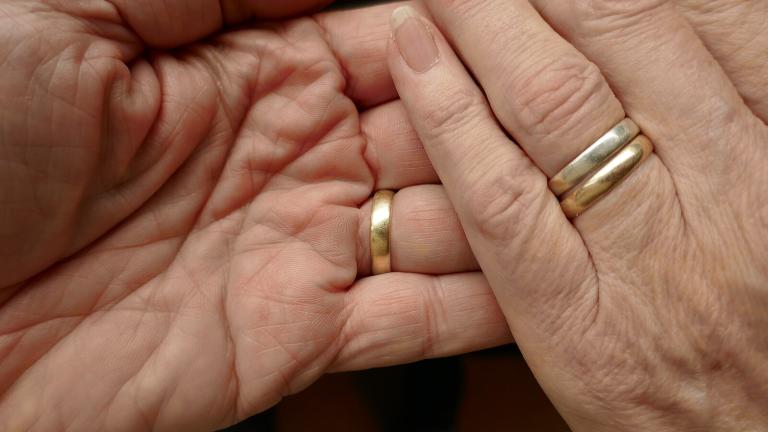My daughter and soon-to-be son-in-law are facing some major school and career decisions today, and here’s what I’ve been telling her this spring: Marriage is meant to change you.
Who you each are, separately, as single, unmarried persons is supposed to be different than who the two of you become when you are intimately joined in a lifelong, life-giving union. The whole point is to become something different! If you wanted your life to be exactly how it was before, you wouldn’t be getting married!
So it is with the priesthood, with religious life, with parenting . . . with undertaking any serious vocation, religious or secular.
So often we hear moms — it’s usually the mom — saying “I’ve lost my identity now that I have a baby.”
When you dig underneath, there are different kinds of common identity concerns:
- Her identity was tied up in her career, but now she’s staying home and feels herself slipping away from her profession and her financial self-sufficiency.
- Previously she found her identity in hobbies and pastimes that just don’t mesh with caring for a baby, so now what?
- Her body has completely changed and it’s never going back to how it was, and she really loved identifying with how it used to be.
–> Pause here to note that moms who continue pursuing their careers after having kids often report struggling with a different identity crisis.
Too often work-at-work moms are expected to bring no hint of the impact of their new family life with them into the office, lest they sabotage their employment opportunities, and furthermore they are somehow supposed to also pull off everything some fictional, hyper-idealized stay-at-home-mom reputedly does with her kids.
Meanwhile the loss of free time and the struggles with body image apply equally or more so.
Sometimes the “identity” crisis isn’t about identity at all, though, but about a serious and potentially even life-threatening situation:
- She is overworked, exhausted, not getting enough sleep, and struggling with basic physical needs, and no surprise this is wearing her into a state of despair.
- She is under-appreciated and taken for granted in her new life as a caregiver, and can’t get the emotional and practical support that she needs.
- She is criticized and demeaned for “not doing enough” or being “incompetent” because she has taken on an endless, enormously difficult task that will never, ever be done to perfection because hello caring for a baby is not, at all, like finishing some project at the office.
This is not the way. None of this is.
When I talk below about finding your identity in your new vocation, that does not mean “finding yourself” in neglect, abuse, or casual indifference from the people who are supposed to love and care for you.
It’s normal to find parenting and other serious vocations to be highly demanding and challenging pursuits. It is not normal or healthy to be driven to feeling hopeless, worthless, isolated, burnt-out, or unable to cope.
If that last list is you, claw your way to a place and physical and emotional safety and start figuring out what changes you can make to get out and stay out of the black hole.
I had a pastor once who really liked going to the gym in a regular t-shirt and shorts, or going around town on his day off in a generic polo and khakis, and being taken for just some random guy. He loved being a priest, and truly relished giving of himself in priestly service to others, but sometimes he needed the emotional space that comes with no one coming up to you for priest-stuff.
That’s cool.
No matter how much you love your kids, it’s pretty likely you need some breathing space to not be needed for a little bit, while the kids are safely being tended by some other person.
No matter how much you love your profession, and how much the world desperately needs the work that you do, sometimes you need to turn off the phone and let someone else deal with the thing while you take well-earned vacation.
No matter how vital and soul-saving your ministry is, you can only give yourself away to others if there is something of you left to give.
None of this is about “identity” — it’s just common sense.
So what is identity about?
I had a great aunt who shared with me something my generation didn’t fully understand: When the wedding announcements or society pages in the local paper back in the day referred to the bride by the husband’s name, “Mrs. John Smith” or what have you, it was a moment the girls longed for and cherished.
They loved taking their husbands’ names, in full, not because they were losing themselves, but rather because to them it was about arriving: I am so proud of who he and I are becoming, now that we are one. We are undertaking a mission together, and I am proud of the man I have chosen to be my partner in this life we are going to forge.
That proper sense of joy and self-identification with a mission and vocation wasn’t then and isn’t now about naming conventions, or who watches the baby, or what kind of professional career you do or don’t pursue.
Rather, it’s this: A great vocation changes us. It changes who and what we are.
One of the ladies I play hockey with will often explain some quirk about her day or her choices or her interests by saying, “Well, I mean, it’s probably because I’m a nurse.”
It’s changed her. She poured her life into an irreplaceable and invaluable vocation, and she is therefore a different person than she was so many years ago, before she gave her life to caring for an unending line of patients who desperately needed the help she had studied for and practiced to be able to give.
Sometimes, though, our vocations call us into a new and unwanted identity.
It is hard, so hard, when you find your life being pared down to a set of constraints you didn’t choose.
It’s hard enough when you walk into a vocation — a marriage, a religious vocation, a career, a ministry, a new child — and face in full the normal and expected sacrifices but which bite more keenly than you’d imagined.
Even harder is when the sacrifices you must make in life come from things no one expects or deserves: Unjust financial or legal problems, betrayal by someone in a position of trust, illness or injury, bereavement, disaster, or just some miserable combination of bad luck and weirdly converging lousy circumstances.
But even here, we have an opportunity for a horrible vocation to become a great vocation. I didn’t choose this suffering, but I will allow myself to be changed as a result into something and someone new and different and good.
I will do all I can to leave a legacy of virtue even as everything I once held dear diminishes and wafts away on the breeze.
So I am going to tell a story about these kids I mentioned up top. My daughter and her fiancé have just wrapped up undergrad, and as they get married this summer they are also entering a transitional period of figuring out graduate school and jobs and next steps.
All spring I’ve been telling my daughter: It’s okay if your major life choices as a wife are different than what you would choose if you were single. It’s not bad or wasteful or letting anyone down if you make job and school decisions for your marriage that are different than what you’d do otherwise. That’s normal and healthy and all part of it.
But here is what happened: She got offered this thing (and she has to decide on it today) that is her dream opportunity in so many ways, but the logistics are a mess. To accept the position would be to ask her husband to make an enormous sacrifice just weeks into their marriage.
So he said to her, “But if I had this opportunity, I wouldn’t be able to pass it up. So if you want to take it, I will figure something out.”
And whatever that something turns out to be, we will know that marriage has changed who and what he is. Instead of being a guy who does his own preferred things, he’s now a guy who steps up and sacrifices out of love for his wife.















